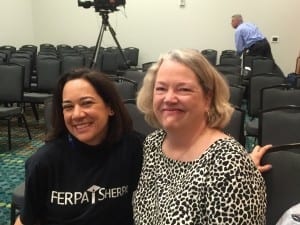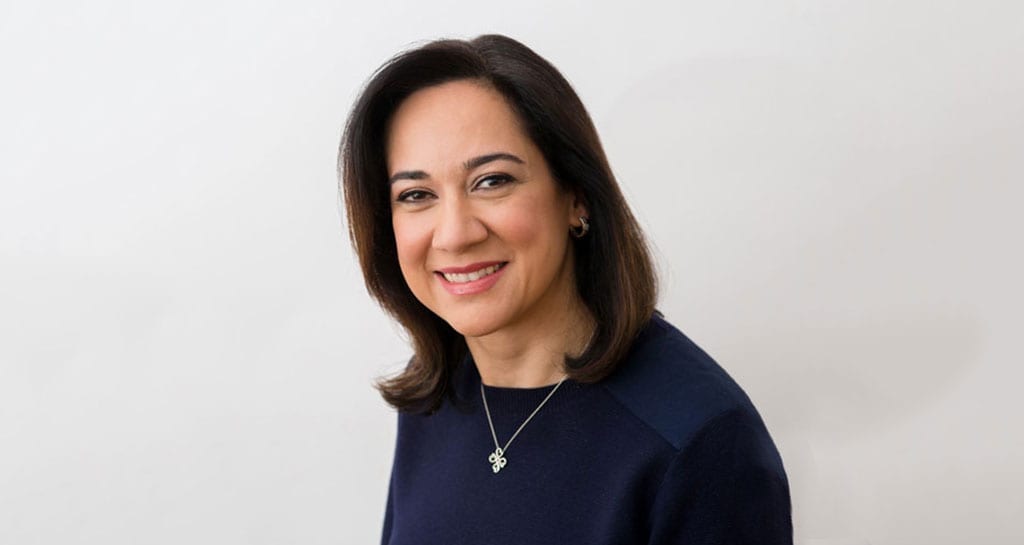Guess what?? I got to meet Kathleen Styles, the US Department of Education Chief Privacy Officer. Not only did I get to meet with her, we had the opportunity to talk student privacy and the challenges ahead. All this happened as part of a panel I participated on at the National School Boards Association (NSBA) conference in Nashville. With the increased use of student data systems and SLDS used for education decision making and reporting, this panel was particularly important for members of School Board Associations.
 During the panel discussion, there were many questions about how to best protect student privacy without impeding the effective use of this information. How do we preserve the reliability of the data while ensuring student privacy? The unanimous consensus is that we need to balance the need for student data with protecting student privacy. This balance can foster trust between the stewards of the data (schools) and the owners of this data (students and parents). But how do we get there? How do we get to the point that we trust schools and school boards to make the right decisions when it comes to ensuring student privacy? My claim is that we need transparency to build trust. We cannot have privacy discussions in a vacuum or enact one-way policies and then expect parents, students and schools to work together and trust each other. Student data is a big deal. There is no other way to say it. It is student information, and yet students lack ownership in the decision making process. So we need to create concrete steps to help schools build transparency into their practices. More importantly, there is a deep need for training and help in implementing best practices in schools so that they can not only adequately safeguard student data but build trust between all stakeholders.
During the panel discussion, there were many questions about how to best protect student privacy without impeding the effective use of this information. How do we preserve the reliability of the data while ensuring student privacy? The unanimous consensus is that we need to balance the need for student data with protecting student privacy. This balance can foster trust between the stewards of the data (schools) and the owners of this data (students and parents). But how do we get there? How do we get to the point that we trust schools and school boards to make the right decisions when it comes to ensuring student privacy? My claim is that we need transparency to build trust. We cannot have privacy discussions in a vacuum or enact one-way policies and then expect parents, students and schools to work together and trust each other. Student data is a big deal. There is no other way to say it. It is student information, and yet students lack ownership in the decision making process. So we need to create concrete steps to help schools build transparency into their practices. More importantly, there is a deep need for training and help in implementing best practices in schools so that they can not only adequately safeguard student data but build trust between all stakeholders.
This is a tall order. Members of School Boards need to gather information from various sources in order to decide what works best for their particular school district. We need to provide better guidance and information on how best to protect student privacy while implementing tight security practices. Schools require training and materials that will support the implementation of comprehensive privacy practices in schools. How can budget and time strapped schools dedicate any time to privacy? It is difficult when you have limited resources and schools are faced with an either/or decision where privacy likely always comes second. Schools are often forced to choose between fixing the desks, buying textbooks and investing in privacy. So I get it but that doesn’t mean we stop the conversation. It means we find smarter ways to work on this because the topic is so important. It is time for School Boards to provide guidance to principals and teachers and help them develop best day-to-day operation practice.
Having these panel discussions is not going to magically fix the issues we continue to struggle with when it comes to student privacy. However, making policies available to the broader audience, explaining in a clear and concise manner how data is (or isn’t) used helps shift peoples conversations and broadens everyone’s lens when moving forward. An important part of the panel discussion was how do we build that trust and enact best practices. Members of School Boards want to do the right thing but at the same time don’t want to be limited by state and federal regulations that could potentially impede the use of data.
I walked away from this panel thinking how we need to develop concrete steps to help school boards on how to create privacy frameworks that commit schools to greater transparency. Because once we have transparency and build trust our conversation can focus on establishing sound practices that will enable us to effectively use student data while protecting student privacy.
 Of course, members of School Boards can always visit our own Student Privacy Compass website or the newly developed PTAC from the US Department of Education as well as iKeepSafe’s website. All full of pragmatic, practical and objective resources for anyone looking to learn more about student data privacy. I for one consider myself incredibly lucky to have had the opportunity to be on this panel. Not only did I learn a tremendous amount on student data privacy, but I was able to meet great people like our own Student Privacy Compass, Alan Smpson from iKeepSafe, our panel facilitator Laurie Dechery from Lifetouch and, of course Kathleen Styles. These are conversations we need to have to establish a collaborative framework. These are the conversations that begin at conferences but continue to be debated. I have my ideas on how many people will be attending the privacy discussions at this conference – and my guess is a lot. A lot of people will need privacy discussions to be at the forefront of future conferences.
Of course, members of School Boards can always visit our own Student Privacy Compass website or the newly developed PTAC from the US Department of Education as well as iKeepSafe’s website. All full of pragmatic, practical and objective resources for anyone looking to learn more about student data privacy. I for one consider myself incredibly lucky to have had the opportunity to be on this panel. Not only did I learn a tremendous amount on student data privacy, but I was able to meet great people like our own Student Privacy Compass, Alan Smpson from iKeepSafe, our panel facilitator Laurie Dechery from Lifetouch and, of course Kathleen Styles. These are conversations we need to have to establish a collaborative framework. These are the conversations that begin at conferences but continue to be debated. I have my ideas on how many people will be attending the privacy discussions at this conference – and my guess is a lot. A lot of people will need privacy discussions to be at the forefront of future conferences.


